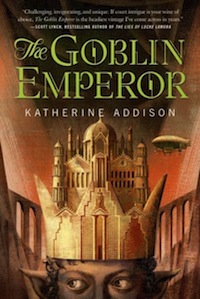It took me some time to begin writing this review. For some days after I read The Goblin Emperor (and I read it three times straight through in three days), I had to sit on the urge to open any discussion of this novel with CAPSLOCK EXCLAMATIONS OF ENTHUSIASM, continue the discussion with more such exclamations, and conclude with CAPSLOCK JOY.
As you can see, the urge hasn’t entirely gone away.
Katherine Addison is the open pseudonym of Sarah Monette, author of The Doctrine of Labyrinths series and co-author, with Elizabeth Bear, of A Companion to Wolves and A Tempering of Men. The Goblin Emperor is her first novel under this new name. It should be emphasised right up front that while the worldbuilding is every bit as detailed and baroque as her previous solo novels under her other name, the mood leans far less toward the noir than The Doctrine of Labyrinths. The tone is overall much more hopeful, and the main character here far more likable, than in any of her previous novels.
That main character is Maia, last and least regarded of the sons of the emperor. Maia has spent his entire life in an impoverished sort of internal exile, more than half of it under the guardianship of a man who hates him. But the death of the emperor Varenechibel IV and his three elder sons in an airship crash means that Maia has inherited the empire—if he can keep his inheritance, and avoid becoming the pawn of other players in his court.
And live out the year.
Especially since it transpires that the airship crash that killed Varenechibel and his sons was no accidental disaster.
The narrative unfolds mainly within the confines of the Untheileneise Court, lending The Goblin Emperor an enclosed, contained air. Maia comes to his inheritance a lonely young man, and the role of emperor isolates him further: he has had no training to rule, and his struggles to navigate the machinery of power, the paperwork, the personalities, the responsibilities of empire, form a large part of the story. He must make connections and alliances and bind the disparate parts of his empire—and his household—together in peace and security: it seems fitting from a thematic perspective that one of the projects with which he gets most interested is the construction of a bridge over the river that divides two regions of his empire, the Istandaärtha.
It is a deeply engrossing read—every time I open a page, I find I simply get drawn into the story (which has made looking up spellings for this review rather time-consuming)—but this is only partly because of Addison’s excellent ability to turn a phrase. The sheer compelling attractiveness of Maia’s character figures larger. Because Maia, however desperately unhappy and uncertain he may be, is a fundamentally decent person. His response to having been ignored by his father, to having been abused by his guardian, is to be determined to do better. To be worthy of his power and his responsibilities. To refuse cruelty and caprice.
“In our innermost and secret heart, which you ask us to bare to you, we wish to banish them as we were banished, to a cold and lonely house, in the charge of a man who hated us. And we wish them trapped there as we were trapped.”
“You consider that unjust, Serenity?”
“We consider it cruel,” Maia said. “And we do not think that cruelty is ever just.”
Addison’s worldbuilding is delightfully detailed and thorough. This is a world of printers and clockmakers, airships and opera and black powder and magic. There are intricate layers of rank and address and conventions of language, including a distinction between formal speech (the use of the formal plural we) and informal speech (I, thou). Fortunately a guide of sorts is provided in the form of an afterword, “Extracts from A Handbook For Travellers in the Elflands,” and the aftermatter also includes A Listing of Persons, Places, Things, and Gods, which is rather helpful for keeping track. It all fits together, this complex mechanism of moving parts: it builds a world that makes sense, with nothing misplaced.
This is a book about survival, and betrayal, and friendship, and power, and strength. And it’s a marvellously welcoming, readable one. A book you pick up and read when you’re tired and sad, and all unexpected it’s like being wrapped up in a comforting warm fuzzy blanket of glorious worldbuilding and shiny prose and decent people doing the best they know how.
The Goblin Emperor is the best fantasy I’ve read in quite some time. It’s certainly my favourite of the last great while, and though it’s early days yet, I suspect it may be the best single novel I read this year.
I vigorously recommend it, and I really hope that there’s a sequel in the works. Because I desperately want to read more.
The Goblin Emperor is available from Tor Books April 1st in the US and May 1st in the UK
Liz Bourke is a cranky person who reads books. Her blog. Her Twitter.










